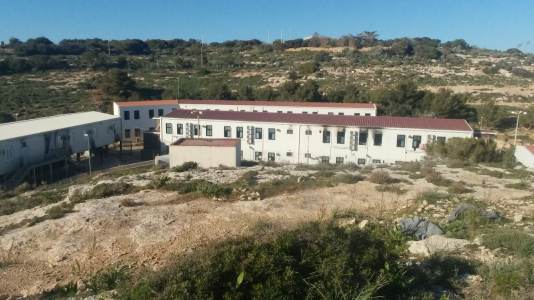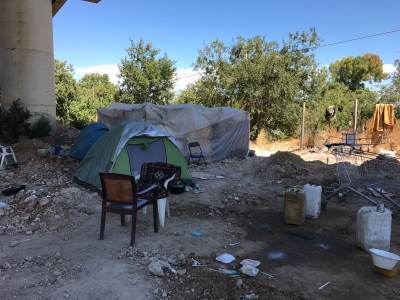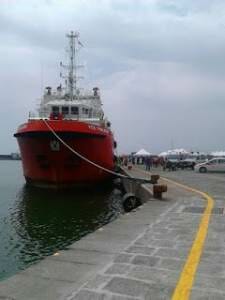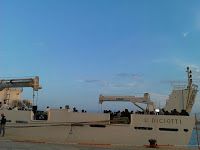Deaths, Rejections and Vulnerable Detentions in the Pozzallo Hotspot: The Daily Tragedy of Those Fleeing to Europe
On
average there are four landings every week at Sicilian ports alone,
along with dozens of deaths and an imprecise number of people missing
at sea. We’re at the beginning of December, but the departures from
Libya continue, with ever less certainty of arriving in Europe. The
first round of shared training between the Libyan Coast Guard and the
Italian Navy has just come to a conclusion on board the navy vessel
San
Giorgio,
carried out by the European Union Naval Force, within the remit of
the EUNAVFORMED operation Sophia. At the same time, the various
humanitarian maritime missions, including the Bourbon
Argos and
the Dignity
of
Doctors Without Borders, Save the Children’s Vos
Hestia
and MOAS*’s Phoenix
will soon be concluding their own rescue operations for several
months.
Thus the possibility of effective, rapid rescues is diminishing while
the probability of military control is always greater within the
Canal of Sicily, together with weather conditions which are obviously
worsening. It isn’t difficult to understand what this means: more
shipwrecks and more victims among the migrants, as well as new
speeches ready to defend the important work undertaken to combat
human trafficking, while the militarisation of Fortress Europe
continues to turn back refugees fleeing into the hands of
traffickers.
There have been several landings recently, in which the bodies of the
dead must be counted along with those of the living, as well as
hundreds of people lost at sea. Today the news has arrived that 438
people will be arriving at Augusta, as well as 14 bodies recovered
from the sea. This morning 380 people arrived at Pozzallo.
Those who manage to arrive alive then meet with the Hotspot approach,
in all of its inhumanity, and the policies of selection and expulsion
manifest themselves, which are always more difficult to describe as
part of a “welcoming” system. Just under a week ago around 150
Moroccan migrants were abandoned outside of the Hotspot at Pozzallo
with a “deferred rejection” notice in their hands, in the worst
tradition of photocopied notifications, sending us back to the
collective expulsions of which Italy has already been found guilty in
the courts. Dozens of people literally thrown into the street in
groups of 50 at a time, left under the heavy rain in a city like
Pozzallo where there isn’t even any structure capable of providing
some respite, dry clothes or a meal to the homeless. Getting to the
bigger cities after this point is no easy task, if not impossible, at
the end of the day and without a penny in your pocket. We stayed with
them for several hours listening to their stories and the
descriptions of the voyages they had undertaken to arrive here. Some
of them were clearly quite young, but already could speak about
things which “they would like to forget”; all of them felt the
urgent need to find some place where they might be considered as
human beings, and not driven out as “illegal people”, as numbers
without a past, as people robbed even of their fundamental human
rights. We know all too well that there rejections only help the
passing of persons from Libyans to other traffickers across Europe,
as well as impressment into black market work, with all due respect
to the fight against human trafficking and the profits of
gang-masters.
Unfortunately North African citizens are not the only ones who are
being systematically rejected by our system. In the same days around
20 Ivorian migrants were sent directly from the port of Augusta to
the detention centre (CIE*) at Pian del Lago in Caltanisetta, while
others of the same nationality, disembarked at Catania were found
wandering the streets of the city with a notice of deferred rejection
in hand. This is an extremely serious and worrying occurrence, as it
throws us back to the use of an illegal practice, one which lacks
respect for all international conventions, the right to asylum and
the Italian Constitution. The Italian state is failing to guarantee
individual protection, instead ridiculing the right to protection in
a continuing, systematic fashion, off the backs of those who do not
have the means to defend themselves, keeping civil society and its
own electorate in the dark about its actions. Among the 20 or so
young Ivorian men we met in Catania, at least seven of them said they
had been “incorrectly” declared as adults, and some of them were
quite clearly very young. The possibility of constructing a dignified
future in Italy and Europe has been blocked and compromised from the
start even for them.
While
the arrivals continue their unflagging rhythm, the daily papers have
by now grown
tired
of reporting about the conditions of migrants, but not of news about
the arrests of suspected boat drivers, among whom there are still
minors.
The investigations, the criteria for selecting and “convincing”
the witnesses, and the legal guarantees effected for those who are
involved in these operations, are all still issues to be understood
much better.
Italy
is sending a message of efficiency to Europe, providing numbers,
names and faces of suspected boat drivers for public opinion to feed
on, but seems minimally concerned with protecting the rights of
arriving migrants. Recently some minors were transferred from the
Hotspot at Pozzallo to some of the Extraordinary Reception Centres
(CAS*) in the province, with a notice declaring an incorrect birth
date, sometimes corrected by hand, which certified them as adults.
These are serious violations which usually people can only correct
once they are at the Territorial Commission, forcing minors to spend
long periods of time in centres for adults, without the special
treatment due to them, and with all subsequent complications. We know
that there are still hundred of minors left for weeks in the Hotspot
at Pozzallo and held the port of Augusta, while there are now
frequent reports about vulnerable persons detained within this
structure too. The most recent case relates to a Nigerian women with
a serious psychiatric diagnosis, who arrived in the Pozzallo Hotspot
on October 14th
after having survived one of the past few months’ numerous
shipwrecks. The young women, flagged up as a vulnerable case by
various organisations present both at the port and in the centre, was
left for a month inside the overcrowded Hotspot, without any
appropriate divisions by age or gender, with the now hackneyed excuse
that there are no available appropriate places. This is someone
unable to bathe herself on her own, who needs a calm situation and
individual, appropriate assistance, who has been abandoned in the
first place she was put despite the laws which ought prevent this. We
were made aware of the case once her situation took a new, and
unfortunately no less worrying, direction: On November 11th
the Prefecture of Ragusa transferred her to one of the man
Extraordinary Reception Centres (CAS*) in the province, continuing to
ignore their duty of care for vulnerable persons, who have the right
to stay in places designed for them. The young woman has been seen,
on a voluntary basis, by a psychiatrist she had already met in the
Hotspot, who has provided a first meeting and therapy, while
confirming a diagnosis which is no more reassuring than that of the
previous weeks. She is currently in the care of the MEDU* team, but
her transferral to a specialised structure is still unsure.
The closure and militarisation of Fortress Europe’s borders are
forcing those who arrive into impossible situations, blocking every
real possibility of autonomy and independence. Migrants’ futures,
even for those who are underage of vulnerable, are not structured
according to protection and guidance, but instead remain at the mercy
of the political and economic choices of those who, on this side of
the Mediterranean, continue to support a system of ignored violence.
Lucia Borghi
Borderline Sicilia
Project
“OpenEurope” – Oxfam Italia, Diaconia Valdese, Borderline
Sicilia Onlus
* MOAS = Migrant Offshore Aid Station
*
CIE = Centro di Identificazione e Espulsione (Identification
and Expulsion Centre)
*
CAS = Centro di Accoglienza
Straordinaria (Extraordinary
Reception Centre)
*
MEDU = Medici per i Diritti Umani (Doctors
for Human Rights)
Translation
by Richard Braude




